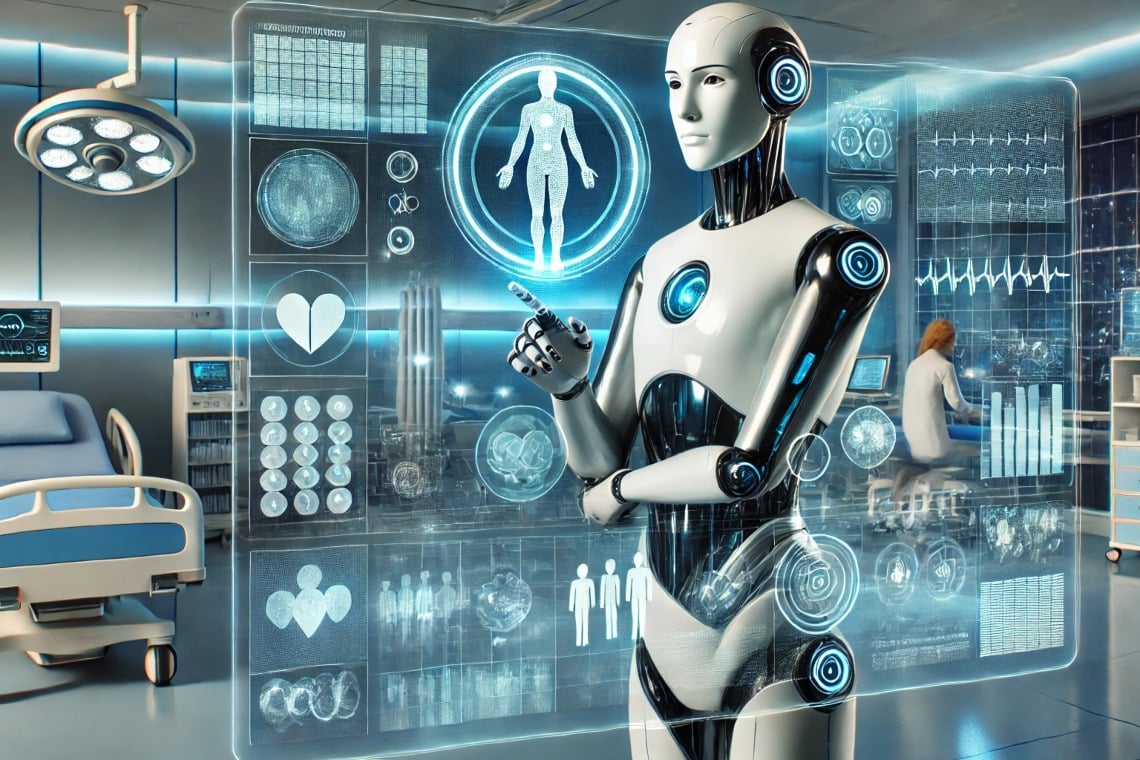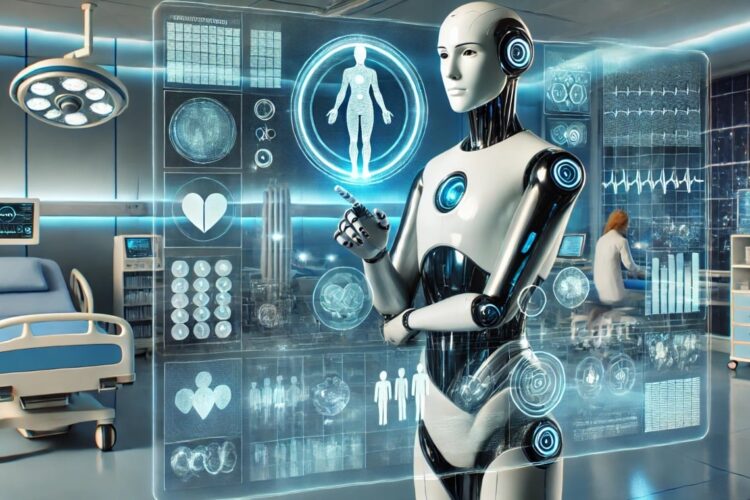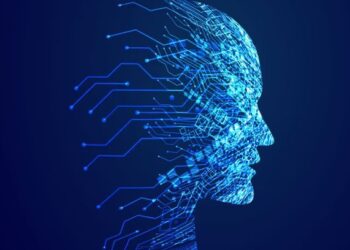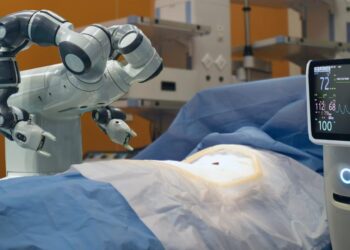The year 2025 marks a pivotal moment in the evolution of healthcare, largely driven by the pervasive and transformative influence of Artificial Intelligence (AI). What was once considered a futuristic concept has now become an integral part of healthcare systems globally, revolutionizing diagnostics, treatment methodologies, drug discovery, patient care, and operational efficiencies. This comprehensive exploration delves into the multifaceted impact of AI on healthcare in 2025, highlighting its advancements, applications, benefits, challenges, and future trajectory.
I. The Ascendancy of AI in Healthcare:
The integration of AI into healthcare is not a sudden phenomenon but rather a culmination of years of research, development, and technological advancements. By 2025, AI technologies have matured significantly, offering sophisticated capabilities that augment and, in some cases, surpass human capabilities in specific healthcare domains. Several key factors have contributed to this rapid adoption:
A. Advancements in Machine Learning and Deep Learning: The core of AI’s impact lies in the progress of machine learning (ML) and deep learning (DL) algorithms. These algorithms can analyze vast datasets of medical images, patient records, genomic information, and research papers to identify patterns, predict outcomes, and personalize treatments with unprecedented accuracy.
B. Increased Availability of Healthcare Data: The digitization of healthcare records and the proliferation of wearable health monitoring devices have generated an enormous volume of data. This “big data” provides the fuel for AI algorithms to learn and improve their performance. Secure and interoperable data platforms have become crucial for harnessing the potential of this data.
C. Enhanced Computing Power: The computational demands of complex AI models require significant processing power. The advancements in cloud computing and specialized AI hardware, such as Graphics Processing Units (GPUs) and Tensor Processing Units (TPUs), have made it feasible to train and deploy sophisticated AI systems in healthcare settings.
D. Growing Investment and Research: Recognizing the transformative potential of AI, governments, private organizations, and research institutions have significantly increased their investment in AI-driven healthcare solutions. This has fostered innovation and accelerated the development of new AI applications.
E. Regulatory Frameworks and Ethical Considerations: As AI becomes more deeply embedded in healthcare, regulatory bodies are evolving frameworks to ensure patient safety, data privacy, and ethical use of these technologies. Striking a balance between fostering innovation and mitigating risks is a key focus in 2025.
II. AI Applications Revolutionizing Healthcare Domains:
The impact of AI is felt across various aspects of healthcare, leading to significant improvements in efficiency, accuracy, and patient outcomes.
A. Precision Diagnostics and Imaging: AI algorithms excel at analyzing medical images, such as X-rays, CT scans, MRIs, and pathology slides, to detect subtle anomalies that might be missed by the human eye. This has led to earlier and more accurate diagnoses of diseases like cancer, diabetic retinopathy, and neurological disorders.
- Radiology and Image Analysis: AI-powered tools can automatically segment images, quantify disease burden, and flag suspicious areas for radiologist review, reducing workload and improving diagnostic accuracy.
- Pathology: AI assists pathologists in analyzing tissue samples, identifying cancerous cells, and grading tumors with greater precision and speed.
- Ophthalmology: AI algorithms can analyze retinal scans to detect early signs of eye diseases, preventing vision loss.

B. Personalized Treatment and Drug Discovery: AI is enabling a shift towards personalized medicine, where treatments are tailored to an individual’s genetic makeup, lifestyle, and disease characteristics.
- Genomics and Pharmacogenomics: AI analyzes genomic data to identify genetic predispositions to diseases and predict how patients will respond to specific medications, optimizing drug selection and dosage.
- Drug Discovery and Development: AI accelerates the identification of potential drug candidates, predicts their efficacy and toxicity, and streamlines the clinical trial process, significantly reducing the time and cost of bringing new therapies to market.
- Treatment Planning and Optimization: AI algorithms analyze patient data to develop personalized treatment plans for complex conditions like cancer, taking into account various factors to maximize treatment effectiveness and minimize side effects.
C. Enhanced Patient Care and Monitoring: AI-powered tools are transforming how patients are monitored, managed, and supported throughout their healthcare journey.
- Remote Patient Monitoring: Wearable devices and AI algorithms continuously monitor vital signs and physiological data, allowing for early detection of health deterioration and proactive interventions, particularly for patients with chronic conditions.
- Virtual Assistants and Chatbots: AI-powered virtual assistants provide patients with information, appointment reminders, medication management support, and answers to frequently asked questions, improving patient engagement and adherence to treatment plans.
- Predictive Analytics for Hospital Management: AI algorithms analyze hospital data to predict patient flow, optimize resource allocation, reduce wait times, and improve overall operational efficiency.
- Elderly Care and Assisted Living: AI-powered robots and smart home systems provide assistance and companionship to elderly individuals, monitoring their well-being and alerting caregivers in case of emergencies.
D. Streamlined Administrative Processes: AI is automating many administrative tasks, freeing up healthcare professionals to focus on patient care.
- Automated Scheduling and Billing: AI systems automate appointment scheduling, insurance claim processing, and billing, reducing administrative burden and errors.
- Medical Record Management: AI assists in organizing, summarizing, and extracting relevant information from electronic health records (EHRs), improving data accessibility and reducing the time spent on documentation.
- Supply Chain Optimization: AI algorithms predict demand for medical supplies and optimize inventory management, ensuring timely availability of necessary resources.
III. Benefits of AI Integration in Healthcare:
The widespread adoption of AI in healthcare by 2025 has yielded numerous benefits:
A. Improved Diagnostic Accuracy: AI algorithms can analyze complex medical data with greater precision, leading to earlier and more accurate diagnoses, ultimately improving patient outcomes.
B. Personalized and Effective Treatments: AI enables the development of tailored treatment plans based on individual patient characteristics, maximizing treatment effectiveness and minimizing adverse effects.
C. Enhanced Patient Experience: AI-powered tools improve patient engagement, provide convenient access to information and support, and streamline administrative processes, leading to a more positive healthcare experience.
D. Increased Efficiency and Reduced Costs: Automation of tasks, optimized resource allocation, and faster drug discovery contribute to significant cost savings and improved efficiency within the healthcare system.
E. Early Disease Detection and Prevention: AI algorithms can identify individuals at high risk of developing certain diseases, allowing for proactive interventions and preventive measures.
F. Support for Healthcare Professionals: AI tools augment the capabilities of healthcare professionals, providing them with valuable insights and reducing their workload, allowing them to focus on complex cases and patient interaction.

IV. Challenges and Considerations:
Despite the immense potential of AI in healthcare, several challenges and considerations need to be addressed:
A. Data Privacy and Security: The use of sensitive patient data by AI systems raises significant concerns about privacy and security. Robust data protection measures and ethical guidelines are crucial.
B. Algorithmic Bias and Fairness: AI algorithms are trained on data, and if this data reflects existing biases in healthcare, the AI systems may perpetuate or even amplify these biases, leading to disparities in care. Ensuring fairness and equity in AI algorithms is essential.
C. Interpretability and Explainability: Some complex AI models, particularly deep learning algorithms, can be “black boxes,” making it difficult to understand how they arrive at their conclusions. Explainable AI (XAI) is a growing field focused on making AI decisions more transparent and understandable to clinicians.
D. Regulatory Hurdles and Adoption Barriers: The rapid pace of AI innovation can outpace regulatory frameworks. Clear guidelines and standards are needed to ensure the safe and effective deployment of AI technologies. Furthermore, the integration of AI into existing healthcare workflows can face resistance and require significant investment in infrastructure and training.
E. Ethical Considerations and Responsibility: As AI plays a more significant role in clinical decision-making, questions arise regarding responsibility and accountability in case of errors or adverse outcomes. Clear ethical guidelines and legal frameworks are necessary.
F. The Human Element in Healthcare: While AI can automate tasks and provide valuable insights, the importance of human empathy, compassion, and the doctor-patient relationship remains paramount in healthcare. Integrating AI in a way that complements and enhances human interaction is crucial.
V. The Future Trajectory of AI in Healthcare:
Looking ahead, the role of AI in healthcare is expected to become even more profound and integrated. Several trends are likely to shape the future:
A. Federated Learning and Collaborative AI: To address data privacy concerns, federated learning approaches will allow AI models to be trained on decentralized datasets without sharing sensitive patient information.
B. Multimodal AI Integration: Future AI systems will likely integrate data from various sources, including imaging, genomics, text, and sensor data, to provide a more holistic view of patient health.
C. AI-Driven Personalized Wellness and Prevention: AI will play an increasingly important role in promoting proactive health management and disease prevention through personalized recommendations and interventions.
D. Robotics and Automation in Surgery and Patient Care: AI-powered robots will become more sophisticated and autonomous in surgical procedures and patient care tasks, enhancing precision and efficiency.
E. The Rise of “AI Doctors” and Diagnostic Assistants: While not entirely replacing human physicians, AI-powered diagnostic assistants will become increasingly sophisticated, providing clinicians with real-time insights and decision support.
F. Focus on Explainable and Trustworthy AI: Continued research and development in explainable AI will be crucial for building trust and facilitating the widespread adoption of AI in clinical practice.
Conclusion:
In 2025, Artificial Intelligence has undeniably revolutionized the healthcare landscape, offering unprecedented opportunities to improve diagnostics, personalize treatments, enhance patient care, and streamline operations. While significant progress has been made, addressing the challenges related to data privacy, algorithmic bias, interpretability, and ethical considerations remains crucial for realizing the full potential of AI in healthcare. As AI continues to evolve, its integration into healthcare will undoubtedly deepen, ushering in an era of more precise, efficient, and patient-centric healthcare for all.











